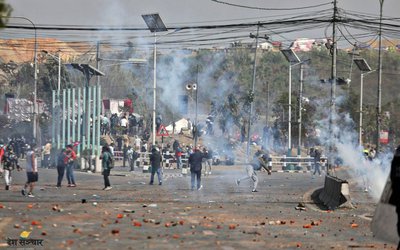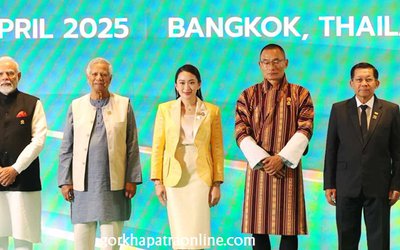More on News
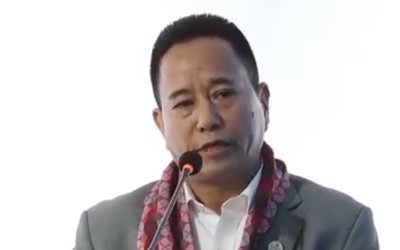
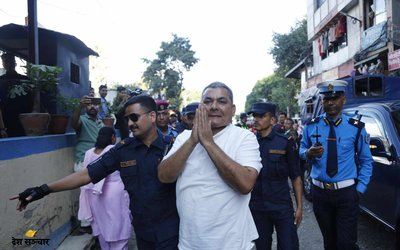

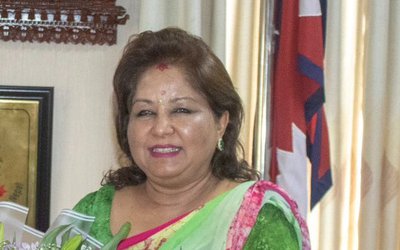
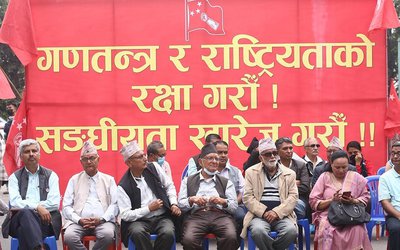
As Winter Olympic Games inaugurated in Sochi Russia, Russian Center of Science and Culture Kathmandu Organized a program which includes inauguration of photo exhibition, video on opening ceremony of the Winter Olympic in Sochi. Russian Ambassador to Nepal Dr. Sergey Velichkin and Director of the RCSC Stanislav Simakov and the Vice President of Nepal Olympic Committee Umesh Lal Shrestha highlighted the event.
"Although athletes from 88 countries took part in the Olympic, Nepal's participation is just as observer. Nepal also needs to take actively in Winter Olympic, said Russian Ambassador to Nepal Dr. Sergey Velichkin. "
Russian President Vladimir Putin opened the 2014 Winter Olympics on February 7, 2014. Formally known as the XXII Olympic Winter Games is a major international multi-sport event being held in Sochi, Russia in the tradition of the Winter Olympic Game.
Scheduled for 7–23 February 2014, opening rounds in certain events were held on the eve of the Opening Ceremony, 6 February 2014. Both the Olympics and 2014 Winter Paralympics are being organized by the Sochi Organizing Committee (SOC). Sochi was selected as the host city in July 2007, during the 119th IOC Session held in Guatemala City. It is the first Olympics in Russia since the 1980 Summer Olympics in Moscow.
Director of the RCSC Stanislav Simakov said Nepalese media needs to play important role to promote winter Olympics. "Nepal has immense possibility to make progress in winter Olympic events," said Simakov.
Over 2850 athletes from 89 nations are participating in the game, and Nepal is one of them. A delegation led by Nepal Olympic Committee President has been participating in the event. A total of 98 events in 15 winter sport disciplines are being held during the Games. A number of new competitions—a total of 12 accounting for gender—are being held during the Games, including biathlon mixed relay, women's ski jumping, mixed-team figure skating, mixed-team luge, half-pipe skiing, ski and snowboard slopestyle, and snowboard parallel slalom.
According to a press release, the events are being held around two clusters of new venues; an Olympic Park constructed in Sochi's Imeretinsky Valley on the coast of the Black Sea, with Fisht Olympic Stadium and the Games' indoor venues located within walking distance, and snow events in the resort settlement of Krasnaya Polyana.
In preparation, organizers focused on modernizing the telecommunications, electric power, and transportation infrastructures of the region. While originally budgeted at US$12 billion, various factors caused the budget to expand to over US$51 billion, surpassing the estimated $44 billion cost of the 2008 Summer Olympics in Beijing as the most expensive Olympics in history.
Sochi was elected on 4 July 2007 during the 119th International Olympic Committee (IOC) session held in Guatemala City, Guatemala, defeating bids from Salzburg, Austria, and Pyeongchang, South Korea.
With an average February temperature of 8.3 °C (42.8 °F) and a humid subtropical climate, Sochi is the warmest city to host a Winter Olympic Games. Sochi 2014 is the 12th straight Olympics to outlaw smoking; all Sochi venues, Olympic Park bars and restaurants and public areas are smoke-free during the Games.
The Sochi Olympic Park was built by the Black Sea coast in the Imeretin Valley, about 4 km (2.5 miles) from Russia's border with Georgia. The venues are clustered around a central water basin on which the Medals Plaza is built, allowing all indoor venues to be within walking distance. The new venues include Fisht Olympic Stadium – ceremonies (opening/closing) 40,000 spectators, Bolshoy Ice Dome – ice hockey (final), 12,000 spectators, Shayba Arena – ice hockey, 7,000 spectators, Adler Arena Skating Center – speed skating, 8,000 spectators, Iceberg Skating Palace – figure skating, short track speed skating, 12,000 spectators, Ice Cube Curling Center – curling, 3,000 spectators, Main Olympic village and International broadcasting centre and main press room.





